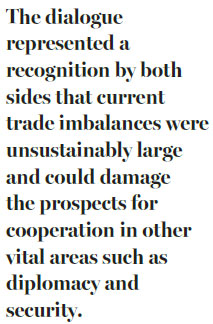Rice deal plants the seeds of change

Sino-US import agreement symbolizes the opening of a more balanced, mutually beneficial trade relationship
Trade talks held in Washington this month provided an open goal for headline writers. "China to import American rice", or some variant thereof, was how much of the US media greeted the positive outcome of a wide-ranging bilateral economic dialogue.
The concept of China, birthplace of rice cultivation and now its most prolific producer and consumer, shipping in supplies from the US was newsworthy from the novelty aspect alone.
In fact, China has been importing rice from elsewhere for some time to meet the demands of a growing population and an increasingly industrialized economy. Purchases, principally from Asian neighbors, have already turned it into the world's biggest rice importer.

The Washington rice deal is the culmination of a decade of negotiations. Shipments will go ahead once Chinese officials have inspected production facilities in the US.
The agreement was important as much for its symbolic value as for the sums involved. Overall, the US exports 3 million to 4 million metric tons a year, while China produces 20 times as much as the Americans.
However, the deal underlines a positive shift in expectations for the future of the US-China economic relationship after the dire threats of a trade war that emerged during Donald Trump's successful "America First" presidential campaign last year.
The Washington talks - officially termed the US-China Comprehensive Economic Dialogue - were the fruits of the first meeting in April between Trump and President Xi Jinping.
Meeting at Trump's Florida resort of Mar-a-Lago, the two leaders agreed to establish the dialogue to resolve differences on perhaps the most crucial area of bilateral relations - trade.
Discussing a one-year action plan for future economic cooperation, the two sides agreed to address a trade imbalance that currently work's in China's favor. Trump complained, during his campaign, of unfair competition from Chinese producers that he said had impoverished traditional US manufacturing states. Chinese stated policy, meanwhile, has been that trade relations should be established on a "win-win" basis that profits both sides.
A statement from the US Commerce Department said the Chinese team had "acknowledged our shared objective to reduce the trade deficit, which both sides will work cooperatively to achieve."

According to the statement, the first 100 days since the Mar-a-Lago summit had seen progress on a number of important issues, including credit ratings, bond clearing, electronic payments, commercial banking and liquefied natural gas. It also noted that China was allowing imports of US beef for the first time since 2003.
"The principles of balance, fairness and reciprocity on matters of trade will continue to guide the American position so we can give American workers and businesses an opportunity to compete on a level playing field," the Commerce Department said.
The Chinese side, for its part, looked forward to an expansion in the trade in services with the US. A statement from the Chinese delegation said expanding bilateral trade in services could help promote balanced trading relations between the nations.
The two sides also agreed to create a more open investment environment and to finalize an investment treaty that has support among US and Chinese business communities.
The dialogue represented a recognition by both sides that current trade imbalances were unsustainably large and could damage the prospects for cooperation in other vital areas such as diplomacy and security.
For China, "win-win cooperation" remains a fundamental foreign policy objective.
In the overall context of the mammoth problems that Washington and Beijing have to resolve to put their economic ties on a new footing, the deal on rice might seem insignificant and even trivial.
But it nevertheless provides a handy symbol for the opening of a more balanced and mutually beneficial bilateral trade relationship.
The author is a senior editorial consultant for China Daily. Contact the writer at harveymorris@gmail.com.
(China Daily European Weekly 07/28/2017 page11)
Today's Top News
- Hainan's special customs operations start strong
- Macao SAR holds flag-raising, reception to mark 26th anniversary of return to motherland
- China issues rules to regulate pricing practices of internet platforms
- US hits over 70 IS-linked targets in Syria in massive retaliatory strikes
- Coffee needs cooperation, not confrontation
- Technological innovation brings cultural heritage alive






























